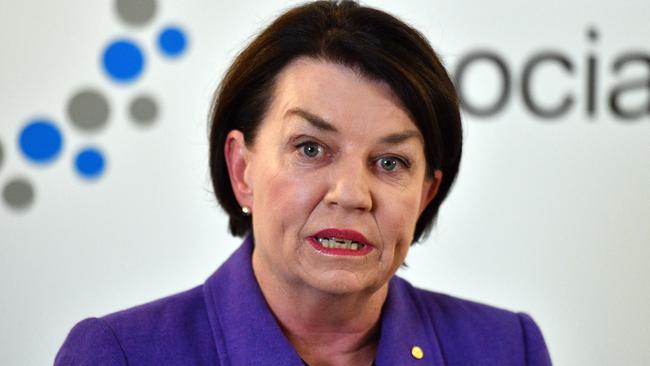Greed, weak regulators behind banking scandals: interim report
OUT-of-control greed among banks and weak corporate cops are to blame for the nation’s financial scandals, royal commission chief Kenneth Hayne says.
Business
Don't miss out on the headlines from Business. Followed categories will be added to My News.
OUT-of-control greed among banks and weak corporate cops are to blame for the nation’s financial scandals, royal commission chief Kenneth Hayne says.
On what Australia’s banks admit is a “day of shame”, Mr Hayne blamed a culture of fat cats lining their pockets at customers’ expense.
“Too often, the answer seems to be greed — the pursuit of short-term profit at the expense of basic standards of honesty,” he said in a blistering interim report.
MCCRANN: FIRST THE BLAME GAME, NOW THE BIG FIX
BROKEN ASIC TOLD TO PROSECUTE TO FIX FINANCE INDUSTRY
PM WARNS BANKS GREED HAS TO STOP
CUSTOMERS WILL WAIT 6 YEARS FOR BANKS TO PAY
“How else is charging continuing advice fees to the dead to be explained? But it is necessary then to go behind the particular events and ask how and why they came about.”
The bombshell findings were delivered in Mr Hayne’s report into the first four rounds of hearings of the Royal Commission into Misconduct in the Banking, Superannuation and
Financial Services Industry, which took place between March and June this year.

It sets the scene for Mr Hayne and his team of QCs to turn the blowtorch on to the bank bosses, themselves, at the next round of public hearings, starting on November 19.
Mr Hayne canvasses the idea of removing bankers’ bonuses linked to sales and profit.
“If customer-facing staff should not be paid incentives, why should their managers, or those who manage the managers?” he said.
He also flags that the federal government’s move to crack down on banker pay — the Banking Executive Accountability Regime — could be beefed up. And he is scathing of the corporate regulators, the Australian Securities and Investments Commission and the Australian Prudential and Regulatory Authority.
“The conduct regulator, ASIC, rarely went to court to seek public denunciation of and punishment for misconduct. The prudential regulator, APRA, never went to court,” Mr Hayne said.
“Infringement notices imposed penalties that were immaterial for the large banks.”
Mr Hayne pointed the finger at ASIC as a gun-shy regulator which responded to misconduct by seeking to resolve it via agreement with the financial institution rather than by prosecution.

Mr Hayne said while ASIC was trying to change its ways, he was not convinced it could become the regulators consumers needed. “Even so, I remain to be persuaded that it can and will make the necessary changes,” he said.
ASIC’s chair James Shipton remained tight-lipped after copping the hiding from Mr Hayne.
“ASIC notes the report’s serious and important observations of ASIC’s role as a regulator,” he said.
Australian Banking Association chief executive officer Anna Bligh said the interim report “makes a day of shame for Australia’s banks”. Mr Hayne raised more than 100 questions about possible reform areas.
These include changes to prevent conflicts of interest involving mortgage brokers, whether to tighten mortgage assessment criterias, and if banks should own companies that manufacture wealth products.
One of the main questions is if new regulatory laws are needed or whether existing laws need to be simplified and enforced.
Mr Hayne queried if bodies such as ASIC were being asked to do too much.

PAY STRUCTURES DROVE POOR BEHAVIOUR
Mr Hayne said there “can now be no doubt” that the poor behaviour within financial institutions was driven by the way staff and executives were paid.
“All the conduct identified and criticised in this report was conduct that provided a financial benefit to the individuals and entities concerned,” he says in the report.
“The emphasis given to sales and profit, and the rewards that were given for selling the employer’s product, are central reasons for the conduct of banks and intermediaries that has been identified and is criticised in this report. “
Mr Hayne said recent changes made the remuneration practice within the banks did not go far enough and questioned whether executives should be paid any form of incentive payment, particularly when bonuses are tied to sales or profit.
“Eliminating incentive based payments for front line staff will not necessarily affect the ways in which they are managed if their managers are rewarded by reference to sales or revenue and profit,” Mr Hayne says.
“If customer facing staff should not be paid incentives, why should their managers, or those who manage the managers?
- John Dagge
LENDERS’ BENCHMARK CRITICISED
The Household Expenditure Measure (HEM) — the benchmark used to assess a customer’s debts and liabilities — was heavily criticised in the report.
Lenders did not diligently analyse a customer’s household expenses which could restrict or prohibit their ability to take out a loan.
“Using HEM as the default measure of household expenditure does not constitute any verification of a borrower’s expenditure,” the report said.
The report found the big four banks — ANZ, CBA, NAB and Westpac — took some steps to verify the income of a home loan applicant.
The banks said verifying outgoing expenses was “too hard.”
This was interpreted as not being worth the bank’s cost to try and do it.
- Sophie Elsworth


